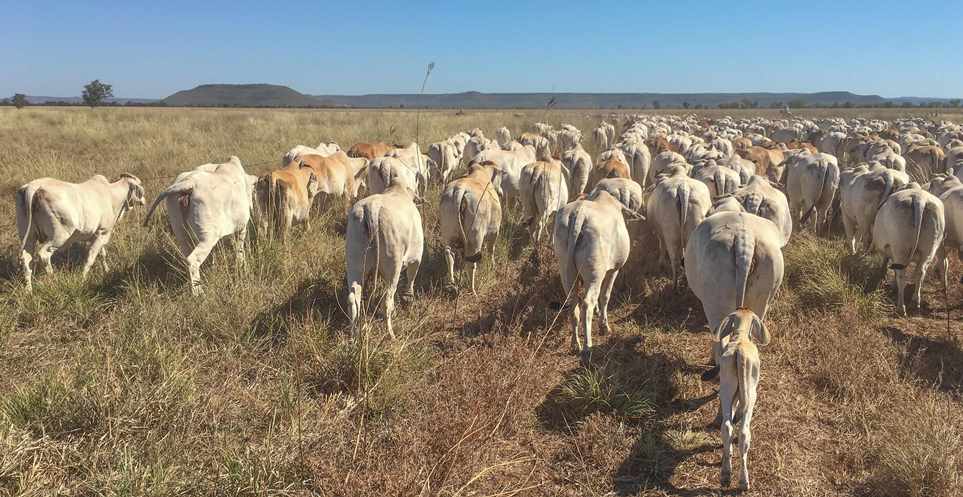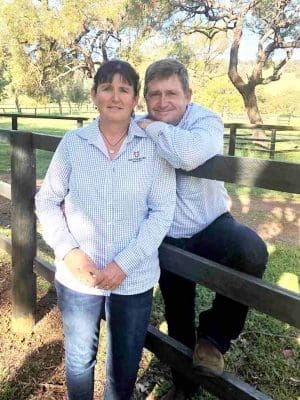
Cows and calves on Heytesbury’s Birrindudu station
HAVING seen the positive impact administering pain relief has made to animal welfare on Heytesbury Cattle Co’s Birrindudu Station in the Northern Territory, Kylie Hutley now describes it as ‘the only way forward’ for the cattle industry.
Kylie and her husband Lance manage 673,200ha Birrindudu, about 700km south-west of Katherine. They currently run about 27,000 head of cattle on the property, with castration and dehorning part of the normal animal husbandry practices.
“These are procedures and practices that we have to do in our industry, especially in the markets we supply, so we’re always looking for ways to handle cattle as quietly and as low-stress as possible,” Ms Hutley said.
“If you can find the master key to our practices for less stress and limiting pain, I think that’s the best outcome, and that’s what really triggered us to start using pain relief.”.
The Hutleys first came across Tri-Solfen a few years ago after reading an article in a trade newspaper about how the product was undergoing the testing phase of development. Tri-Solfen was the first product of its kind to address the legitimate animal welfare concerns associated with routine animal husbandry procedures.
“Being a passionate animal welfare advocate, I thought this was something big,” she recalls.
“Pain relief is a big issue in this industry, so I followed through with some research on that. Then there was an opportunity at a Northern Territory Cattlemen’s Association conference to go to a workshop and watch a small display using Tri-Solfen.”

Birrindudu managers Lance and Kylie Hutley
The product is a topical anaesthetic and antiseptic solution for pain relief and better wound care for use on calves during castration, and now recently approved for use on calves at disbudding and dehorning.
It contains two topical local anaesthetics – fast-acting lignocaine for immediate pain relief and long-acting bupivacaine for prolonged post-operative pain relief. Adrenaline is included for its ability to reduce blood loss, whilst prolonging the anaesthetic action.
Tri-Solfen also contains cetrimide, an antiseptic widely used to cleanse skin and provide wound protection from bacterial contamination. The product’s gel base adheres and protects the wound, facilitating wound healing.
“Here in the Territory you’re dealing with large mobs of cattle, so you tend to find you’re putting a lot of calves through the yards. The quickest practice is to get those breeders back out with their calves.”
It’s on this point that Ms Hutley says she has noticed the biggest difference when using Tri-Solfen during castration and dehorning.
“When calves are treated, they walk around through the mob in the yards straight away, and mum picks them up a lot quicker,” she said.
“Also, when you’re walking them out, they’ll walk the distance, they won’t lay down. It’s like they’re not under as much stress or as much pain as what they would have been without treatment.
“It’s the same when it’s used on weaners, you walk them straight out of the yard when they’re processed, and they will walk for ten kilometres without any problems at all.”
Ms Hutley said Tri-Solfen had proven cost-effective, saying the decision to introduce it into the management practices on Birrindudu was a ‘no-brainer’.
“From an animal welfare perspective, I think this is the only way forward for our industry. There are practices that we have to do and I think that pain relief like Tri-Solfen is one of those key practices. While it’s not a substitute for what we do, it’s showing that we are putting the interests of the cattle first.
“I think if industry can follow that path, that’s the best that we can do, and we’re doing the right thing by our animals that we’re working with.”
“You’ll see the short-term benefits immediately, and it has long-term benefits for the cattle also,” Ms Hutley said.
“My strong advice to producers who are not using pain relief would be to give it a go. You’ll see the results and you won’t turn back.”
Source: Animal Ethics Pty Ltd

Bravo Kylie and Lance Hutley for adopting best animal welfare practice on Birrindudu. Hopefully others in the industry will take note and adopt the same measures to help make meat growing kinder.
Great story ….well done !